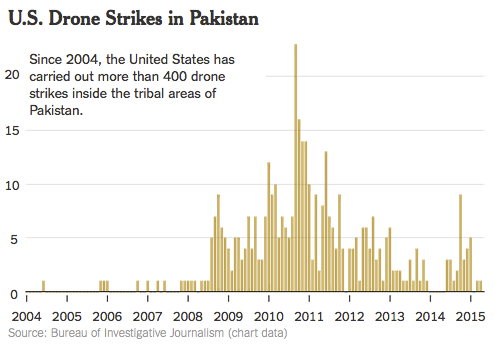http://www.nytimes.com/2015/04/24/world/asia/killing-of-americans-deepens-debate-over-proper-use-of-drone-strikes.html
APRIL 23, 2015
Killing of Americans Deepens Debate Over Use of Drone Strikes
By MARK MAZZETTI
WASHINGTON -- The Obama administration said Thursday that two American Qaeda operatives killed in Pakistan in January had not been "specifically targeted," [1] and officials added that the Central Intelligence Agency had no idea the two men were hiding in compounds under surveillance by armed drones when orders were given to carry out the strikes.
It is an issue of great legal significance because the deliberate killing, without due process, of Americans working for Al Qaeda has been one of the most disputed aspects of Mr. Obama's clandestine drone war, and has been a subject of heated debate among the president's aides.
Officials said Thursday that the two men, Adam Gadahn and Ahmed Farouq, had ascended to senior ranks inside Al Qaeda but that there had never been a Justice Department determination that they could be marked for death. The killing of Mr. Farouq and Mr. Gadahn, by C.I.A. drones, along with the accidental killing of Warren Weinstein, an American aid worker, brings to seven the total number of Americans killed by drone strikes during the Obama administration.
Two years ago, the administration announced that four American citizens had been killed in drone strikes in Yemen and Pakistan during Mr. Obama's presidency, but that only one had been deliberately targeted.
The deliberate target was Anwar al-Awlaki, an American-born radical cleric who had fled to Yemen and joined Al Qaeda in the Arabian Peninsula. Mr. Awlaki was put on a so-called kill list after the administration deemed Mr. Awlaki to be a senior operational terrorist who was plotting attacks against Americans and whose capture in a remote part of Yemen was unfeasible. A legal review by the Justice Department determined that it was lawful to kill him.
A C.I.A. drone launched from a secret base in Saudi Arabia killed Mr. Awlaki in a remote part of Yemen in September 2011. Also killed in that strike was Samir Khan, an American of Pakistani descent who was the publisher of Inspire, Al Qaeda in the Arabian Peninsula's Internet magazine.
Two weeks later, another drone strike in Yemen killed Abdulrahman al-Awlaki, Mr. Awlaki's 16-year old son. American officials have said the teenager was killed by mistake.
More recently, senior Obama administration officials debated whether to kill another suspected American Qaeda operative, Mohanad Mahmoud Al Farekh, [2] who had been hiding in Pakistan's tribal areas. Senior officials at both the C.I.A. and the Pentagon urged that Mr. Farekh be killed in a drone strike, arguing that he had become a senior operational leader in the organization and was responsible for developing roadside bombs that were killing American troops in Afghanistan.
But some administration lawyers pushed back, questioning whether Mr. Farekh posed an imminent threat to the United States and whether he was as significant an operative inside Al Qaeda as the C.I.A. and Pentagon made him out to be.
Mr. Farekh was ultimately arrested by Pakistani security forces last year, based on intelligence provided by the C.I.A.
He was turned over to the United States, and now faces trial in Brooklyn. [3]

[1]
http://www.nytimes.com/2015/04/24/world/asia/2-qaeda-hostages-were-accidentally-killed-in-us-raid-white-house-says.html
[2]
http://www.nytimes.com/2015/04/13/us/terrorism-case-renews-debate-over-drone-hits.html
[3]
http://www.nytimes.com/2015/04/03/nyregion/texas-born-man-flown-back-from-pakistan-is-held-on-terror-charge.html
 [1] http://www.nytimes.com/2015/04/24/world/asia/2-qaeda-hostages-were-accidentally-killed-in-us-raid-white-house-says.html
[2] http://www.nytimes.com/2015/04/13/us/terrorism-case-renews-debate-over-drone-hits.html
[3] http://www.nytimes.com/2015/04/03/nyregion/texas-born-man-flown-back-from-pakistan-is-held-on-terror-charge.html
[1] http://www.nytimes.com/2015/04/24/world/asia/2-qaeda-hostages-were-accidentally-killed-in-us-raid-white-house-says.html
[2] http://www.nytimes.com/2015/04/13/us/terrorism-case-renews-debate-over-drone-hits.html
[3] http://www.nytimes.com/2015/04/03/nyregion/texas-born-man-flown-back-from-pakistan-is-held-on-terror-charge.html